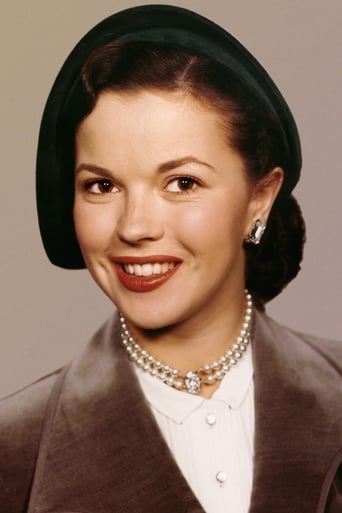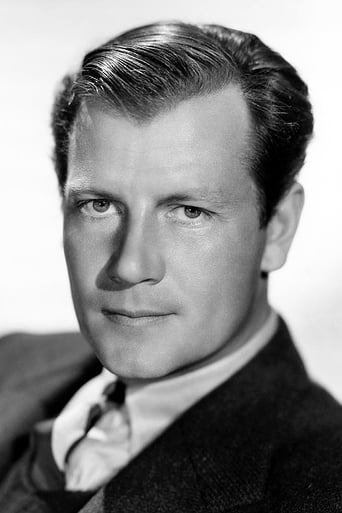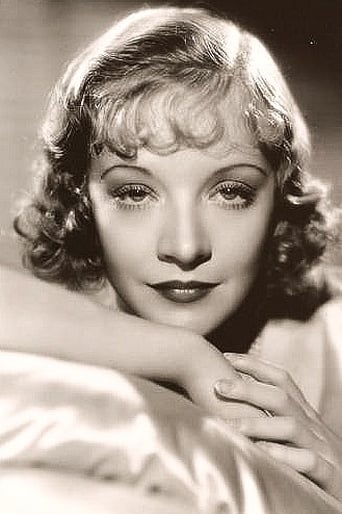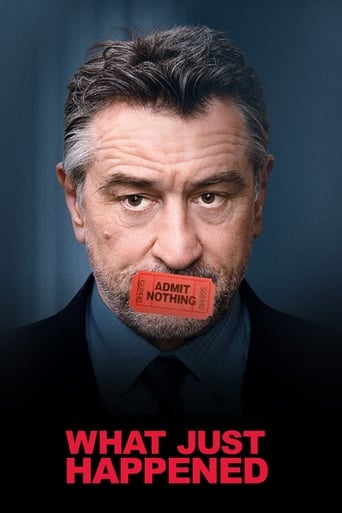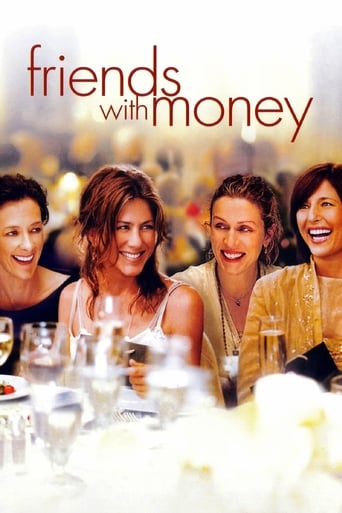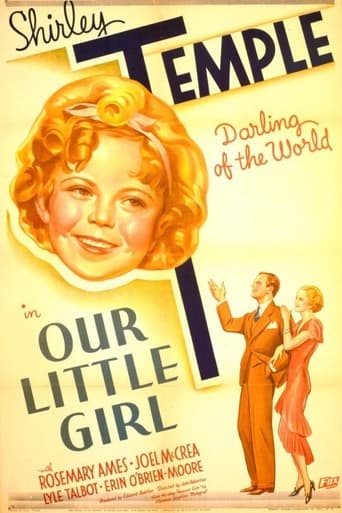
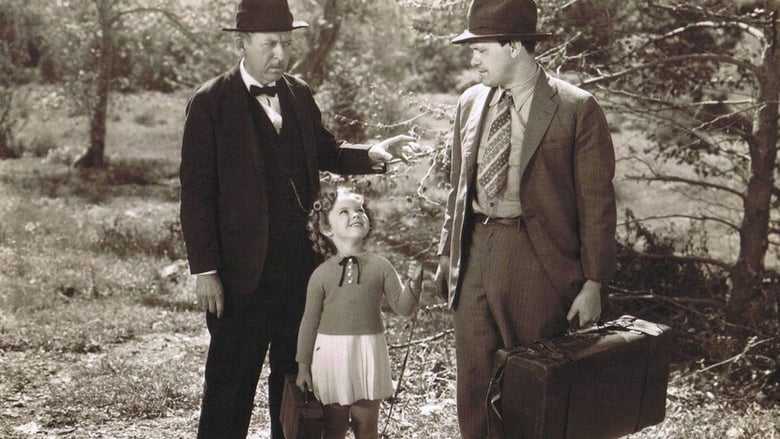
Our Little Girl (1935)
Don Middleton is so caught up with his work he neglects his wife Elsa. Lonely Elsa begins to spend more time with Don's best friend and they become attracted to one another. Don and Elsa decide to get a divorce, unaware of the effect their problems are having on their daughter Molly. When Elsa announces plans to remarry, Molly runs away from home.
Watch Trailer
Cast
Similar titles
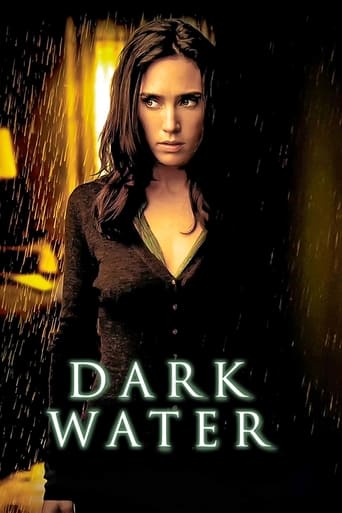


Reviews
That was an excellent one.
Excellent, Without a doubt!!
Better Late Then Never
One of the most extraordinary films you will see this year. Take that as you want.
During this film, a love quadrangle develops, then dissipates at the last moment. The wife and Doctor husband love each other, and have a 6 year old girl(Shirley), but the wife feels unfulfilled, now that her daughter is less dependent on her, and she doesn't have a job to keep her busy. She is distraught by her cramped social life, with her husband working long hours on his patients and his research. The husband's current nurse is in love with him, but the husband seems not interested in her romantically, although he much appreciates her. The husband's playboy friend strikes up a friendly relationship with the wife, and they spend more time together, mostly at sports, than does the husband and wife. Eventually, they imagine they are in love, and make plans for a quickie divorce and marriage, with Shirley living with the wife and new husband. But Shirley doesn't like her stepfather-to-be, partly, because he "doesn't know how to be a daddy". So, Shirley packs up a few things and hits the road with her little dog. She comes upon a talkative tramp who inquires about her destination. She's going to her favorite picnic spot, by a stream. The husband comes upon the tramp and is told where she says she's going. The wife isn't far behind. They find her unharmed, enjoying her lunch, and decide it's best for Shirley if they don't separate. The 3 end happily reunited.The problem with the screenplay is that nothing has been solved. The husband, wife and Shirley are in the same situation they began with. So, how long is their new found bliss going to last? One obvious solution is for the wife to get a job to keep her busy. But, perhaps she would only be happy working as a nurse, as she did before Shirley was born. But, this is a small town, so there may not be any openings for a nurse. Hubbie likes his current nurse and doesn't want to give her up. So, perhaps they would have to move to a city to find a nursing job. Another possibility would be to have another child, if this was agreeable to both. Still another possibility is to get active in several organizations.This is a very unusual S.T. film, in that she has both parents all the way through. I'm surprised the Hays commission allowed this theme. I've read they frowned on divorce subjects, although there was no actual divorce here. In most of Shirley's films, she's an orphan or missing one of her parents. In no case I'm aware of was the parent missing because of divorce.If you want to see and hear Shirley sing and dance, this isn't the right film. If you just enjoy the cute, vivacious, little girl, this film may satisfy you.
While I enjoy the old Shirley Temple films, I am occasionally shocked at how depressing and scary many of the plots were. In one, she is separated from her father and is pursued by a creepy guy who keeps offering to take her out and buy her candy, in MANY she's an orphan and in this one she's in the middle of two parents who are divorcing! Family-friendly, perhaps, but definitely films with a dark side.In this film, it begins with the Middleton family being happy as can be. Their daughter, Molly (Temple) is adored and everything seems just peachy. However, over time you notice that Dr. Middleton (Joel McCrea) is often so wrapped up in his work that he neglects his sweet wife, Elsa (Rosemary Ames). It's obvious to everyone but him that his wife is lonely and needs him. Eventually, she sets her eyes on the Doc's best friend, Rolfe Brent (Lyle Talbot) and soon she and Brent are in love...and she's seeking a divorce! Molly naturally is effected by all this and eventually runs away! Will these dopey parents give up their selfish ways and make a family for Molly once again? What do you think?!Like so many of Shirley's films, this one is an obvious object lesson on good parenting and the importance of family. So, despite being a tiny bit traumatic, it does all end well and emphasizes good old fashioned values. It is a bit of a departure, though, as in this one Shirley does NOT sing and the film has a much more compact plot than usual...hence its very short running time compared to her other full-length films. Well worth seeing and sweet.
Can Shirley Temple do no wrong? Not in the eye of her Fox employers who continuously cast her as the type of child genius that could reconcile estranged couples, bring peace to waring families and make cranky elders smile even without the benefit of smiling muscles. No temper tantrums or behavioral adjustment medications for her. Not our Miss Shirley.Sometimes this formula worked ("Little Miss Marker", "Heidi"), sometimes it didn't. But audiences of the 30's didn't mind and many don't today. In the case of "Our Little Girl", it is cute at first, but truly unrealistic. Joel McCrea is a hard-working doctor, Rosemary Ames his housewife and Temple their child psychiatrist who weathers their storms of tempted infatuations and runs away seemingly just to teach them a lesson.One scene in the film truly disturbed me, where McCrea, driving down a curvy country road, allows Temple to climb all over him and then try to grab something in the convertible's back seat. Another has Ames and McCrea out for the evening (seperately) and Temple left without an apparent baby sitter. I felt that these sequences should have been accompanied by subtitles which stated "Do Not Try This at Home".
"Our Little Girl" was what the movie going public of the mid 1930s thought of Shirley Temple, but it didn't have quite the success of her earlier films. She wasn't required to burst into song and dance everyone's troubles away, she was needed to be a Little Miss Fixit but only as a little girl caught up in the affairs of wayward adults (Nova Pilbeam was far more convincing in "Little Friend"). This must be one of her only films that give her both a father and a mother, with nothing dire happening to either one of them along the way.Donald Middleton (Joel McCrea) is a small town doctor who let domesticity get in the way of his dreams but he is more than making up for it with countless important "experiments" taking him away from Elsa (Rosemary Ames) and little Molly. Trouble is brewing early on when Don almost misses "May Saturday", a picnic at idyllic "Heaven's Gate" where Don and Elsa first met and it is there that they meet new neighbour Ralfe Brent (Lyle Talbot). Donald, being as obtuse as he is, keeps throwing Elsa and Ralfe together, even though Ralfe comments "I wouldn't like to leave my wife with me" etc and Nurse Boynton (Erin O'Brien Moore) is only too eager to console Don.Of course Shirley Temple is the star so there are lots of cute scenes of Shirley testing a cake, playing with Sniff, patting little foals and enjoying the park. But strangely enough no singing except for a pretty mournful lullaby to her doll. By the time "September Saturday" comes around the parents are headed for the divorce court and daddy ends up taking Molly to the circus but, as usual, is called away to the hospital and in the confusion Molly decides to take Sniff for their own "Heaven's Gate" picnic. Along the way she meets a philosophical tramp (J. Farrell MacDonald) who ends up giving Don a lecture on what is important in life!!Joel McCrea was between contracts in 1935 hence his appearance in "Our Little Girl" (apparently Shirley developed a big crush on him) but he was seen to better advantage as yet another overworked doctor in "Private Worlds". Rosemary Ames was promoted as Fox's big new star in "I Believed in You" (1934) but it was a disaster and Fox believed no more in Rosemary.
